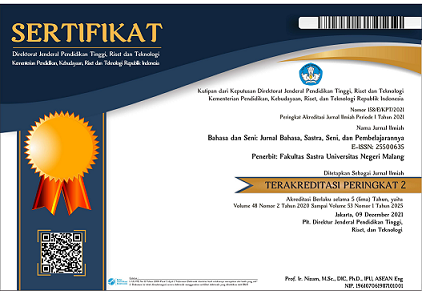IMPLEMENTASI PEMBELAJARAN ENTREPRENEURIAL DALAM PENDIDIKAN SENI RUPA
Abstract
Abstract: This study aims to produce a model of entrepreneurial learning in the field of art education in secondary schools. For this purpose teachers have developed textbooks; the books are designed in accordance with entrepreneurial learning cycle. The study found that art education teaching materials have been designed according to the specific learning strategies potential to improve the entrepreneurial mindset of learners. The results of this study has offered a strategic value to develop entrepreneurship education in Indonesia, especially when considering that the results of this research offers the potential to be extended to other fields and subjects in terms of types and levela of education.
Permalink/DOI: dx.doi.org/10.17977/um015v45i22017p221
Full Text:
PDFReferences
Ahlstrom, D. & Zhujun Ding. 2014. Entrepreneurship in China: An Overview. International Small Business Journal, 32(6):610-618.
Defining Quality in Education. Working Paper Series, 2000, UNICEF. Embracing Diversity: Toolkit for Creating Inclusive, LearningFriendly Environments, 2004, UNESCO.
The 2005 EFA Global Monitoring Report: Education for All, The Quality Imperative, 2005,
Beckman, G.D. 2007. Adventuring’ Arts Entrepreneurship Curricula in Higher Education: An Examination of Present Efforts, Obstacles and Best Practices." Journal of Arts Management, Law & Society 37, no. 2:88-111.
Beckman, G. dan Essig, L. 2012. Arts entrepreneurship: A conversation. Artivate: A Journal of Entrepreneurship in the Arts, 1(1), 1-8.
Bolton, B. dan Thompson, J. 2005. Entrepreneurs, Talent, Temperanment, Technique, Elseveir, ButterworthHeinemann, Burlington.
Booth, S.B. 2014. A Review of Creativity and Entrepreneurship: Changing Currents in Education and Public Life. Artivate 3, no. 1:14-29.
Dyer, H.J., Gregersen, H.B., & Christense, C.M. 2011. The Innovator’s DNA, Mastering the Five Skills of Disruptive Innovators. Boston, Massacusetts: Harvard Business Publishing.
Erickson, H.L. 2002. Concept Based Curriculum, Teaching Beyond the Fact. California: Corwin Press, Inc.
Garavan, N.T. dan O’Cinneide, B. 1994. Entrepreneurship Education and TrainingProgrammes: A Review and Evaluation — Part 1. Journal of European Industrial Training, 18:3-12.
Global Entrepreneurship Monitor (GEM): http://www.gemconsortium.org
Hatten, T. 1995. Student attitudes toward entrepreneurship as affected by participation in an SBI program. Journal of Education for Business, 7(4), 224227.
Holcombe, R. 1998. Entrepreneurship and Economic Growth. Quarterly Journal of Austrian Economics 1 (2): 45–62
Kiggundu, M.N. 2002. Entrepreneurs and Entrepreneurship in Africa. Journal of Developmental Entrepreneurship, 7:Special Issue on Africa.
Kolb, A. Y. dan Kolb, D. A. 2006. A review of Multidisciplinary application of experiential learning theory in higher education. In Sims, R., and Sims, S. (Eds.). Learning styles and learning: A key to meeting the accountability demands in education. Hauppauge, NY: Nova Publishers.
McClelland, D.C. dan Winter, D.G. 1999. Motivating Economic Achievement. New York: Free Press.
McClelland, D.C. 1995. Achievement and Entrepreneurship: A Longitudinal Study. Journal of Personality and Social Psychology, 14:38992.
McMullan, W.E., Long, W.A. dan Graham, J.B. 1987. Entrepreneurship education in the nineties. Journal of Business Venturing, 2(3), 261275.
Pranata, M. 2015. Pengembangan Model Pendidikan Entrepreneurship Terintegrasi pada Pendidikan Seni Rupa untuk Membangun Karakter dan Pola Pikir Entrepreneurial bagi Peningkatan Daya Saing Bangsa di Era Industri Kreatif. Jakarta: DP2M Dikti, Laporan Penelitian Strategis Nasional Tahun 3. Tidak dipublikasikan.
Swedberg. 2006. The cultural entrepreneur and the creative industries: Beginning in Vienna. Journal of Cultural Economics, 30(4), 243-
Refbacks
- There are currently no refbacks.

This work is licensed under a Creative Commons Attribution 4.0 International License.

Dear Sir/Madam
We appreciate your continued confidence and trust in Bahasa dan Seni: Jurnal Bahasa, Sastra, Seni, dan Pengajarannya (JBS). In order to enhance the service, readability, and quality of JBS publications, we will be transitioning to a new website, https://citeus.um.ac.id/jbs, in collaboration with Digital Commons (Elsevier) starting in July 2024.
Sincerely
Yusuf Hanafi
(Editor in chief)















2.png)